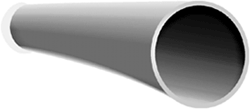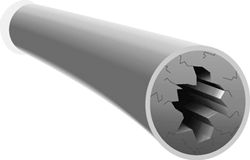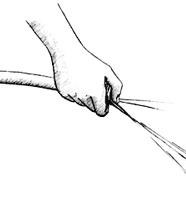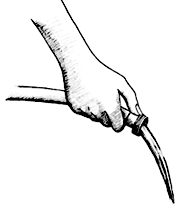| Too much sugar in the blood for a long time causes diabetes problems. This high blood sugar can damage many parts of the body, such as the heart, blood vessels, and kidneys. Diabetes problems can be scary, but there is a lot you can do to prevent them or slow them down. This article is about heart and blood vessel problems caused by diabetes. You will learn the things you can do each day and during the year to stay healthy and prevent diabetes problems. |
|
- What should I do each day to stay healthy with diabetes?
- What do my heart and blood vessels do?
- What damages my heart and blood vessels?
- What can I do to prevent heart and blood vessel problems?
- How do my blood vessels get clogged?
- What heart problems can unhealthy blood vessels cause?
- How does heart disease cause high blood pressure?
- What are the warning signs of a stroke?
- How can clogged blood vessels hurt my legs and feet?
- What can I do to prevent or control peripheral vascular disease?
- Which medical tests will help me keep track of any heart or blood vessel problems?
- For more information
What should I do each day to stay healthy with diabetes?
 | Follow the healthy eating plan that you and your doctor or dietitian have worked out. Eat your meals and snacks at around the same times each day. |
| Be active a total of 30 minutes most days. Ask your doctor what activities are best for you. | |
 | Take your diabetes medicine at the same times each day. |
 | Check your blood sugar every day. Each time you check your blood sugar, write the number in your record book. Call your doctor if your numbers are too high or too low for 2 to 3 days. |
 | Check your feet every day for cuts, blisters, sores, swelling, redness, or sore toenails. |
 | Brush and floss your teeth and gums every day. |
 | Don't smoke. |
What do my heart and blood vessels do?
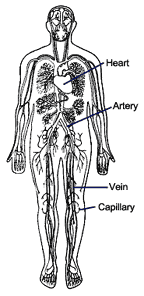
Your heart and blood vessels make up your circulatory (SIR-kyoo-la-TOR-ee) system. Your heart is a big muscle that pumps blood through your body.
Your heart pumps blood carrying oxygen to large blood vessels, called arteries (AR-ter-eez), and small blood vessels, called capillaries (KAP-ih-lair-eez). Other blood vessels, called veins, carry blood back to the heart.
What damages my heart and blood vessels?
- Having high blood sugar.
- Having high blood pressure.
- Smoking cigarettes.
- Having high blood cholesterol
(kuh-LES-ter-all) and other
abnormal blood fats.
- Eating foods full of saturated
fat and cholesterol.
- Being overweight.
- Not being active.
What can I do to prevent heart and blood vessel problems?
- Keep your blood sugar and blood pressure as close to normal as you can.
- Keep blood cholesterol and other blood fats as close to normal as you can.
- Take your diabetes medicines at the same times each day.
- Take your heart pills and blood pressure pills as your doctor tells you.
- Ask your doctor if you should take an aspirin each day to help protect your heart.
- Follow the healthy eating plan you work out with your doctor or dietitian.
- Don't smoke.
- Tell your doctor right away if you think you have any signs of heart or blood vessel problems. Symptoms of heart and blood vessel problems can be shortness of breath; dizziness; pain in the chest, arms, shoulder, or back; sudden loss of sight; trouble talking; or numbness or weakness in one arm or one leg. You also may feel very tired and have swollen ankles or feet. See What are the warning signs of a stroke?
- Be active a total of 30 minutes most days. Use stairs; park farther from the shopping center. Walk, swim, do housework, or garden. Check with your doctor to know what activities are best for you.
- Get to a healthy weight.
How do my blood vessels get clogged?
Several things, including having diabetes, can increase your blood cholesterol too much. Cholesterol is a substance that is made by the body and used for many important functions. It is also found in some animal foods we eat. When cholesterol is too high, the insides of large blood vessels become clogged and narrowed. This problem is called atherosclerosis (ATH-uh-row-skluh-RO-sis).
Clogged and narrowed blood vessels make it harder for enough healthy blood to get to all parts of your body. This can cause one or more problems.
Healthy Blood Vessel |
Clogged and Narrowed Blood Vessel |
What heart problems can unhealthy blood vessels cause?
When arteries become clogged and narrowed, you may have one or more heart problems:
- Chest pain, also called angina (an-JY-nuh). When you have angina, you feel pain in your chest, arms, shoulders, or back. You may feel the pain more when your heart works faster, such as when you exercise. The pain may go away when you rest. You also may feel very weak and sweaty. If you do not get it treated, chest pain may happen more often. If diabetes has damaged the heart nerves, you may not feel the chest pain.
- Heart attack. A heart attack happens when a blood vessel in or near the heart becomes blocked. Not enough blood can get to that part of the heart muscle. That area of the heart muscle stops working, so the heart is weaker. During a heart attack, you may have chest pain along with nausea, indigestion, extreme weakness, and sweating.
- Cardiomyopathy (KAR-dee-oh-my-OP-uh-thee). Cardiomyopathy happens when narrowed blood vessels let less blood flow through the heart. This damage makes the heart muscle weak.
How does heart disease cause high blood pressure?
Clogged and narrowed blood vessels leave a smaller opening for blood to flow through. It is like turning on a garden hose and holding your thumb over the opening. The smaller opening makes the water shoot out with more pressure. In the same way, narrowed blood vessels lead to high blood pressure. Other factors, such as kidney problems and being overweight, also can lead to high blood pressure.
Diabetes and high blood pressure often go hand-in-hand. If you have heart, eye, or kidney problems from diabetes, high blood pressure can make them worse.
High Pressure | Low Pressure |
| A smaller opening makes the water pressure higher. In the same way, clogged blood vessels lead to high blood pressure. | |
You will see your blood pressure written with two numbers separated by a slash. For example: 120/70. Keep your first number below 130 and your second number below 85.
If you have high blood pressure, ask your doctor how to lower it. Your doctor may ask you to take an ACE inhibitor. This type of blood pressure medicine is best for people with diabetes who have kidney problems because it helps keep the kidneys healthy.
To lower your blood pressure, your doctor may also ask you to lose weight; eat more fruits and vegetables; eat less salt and high-sodium foods such as canned soups, luncheon meats, salty snack foods, and fast foods; and drink less alcohol.
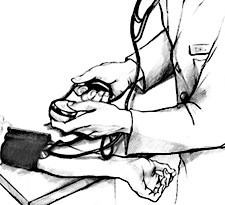 | To lower blood pressure, get to a healthy weight. |
What are the warning signs of a stroke?
A stroke happens when part of your brain is not getting enough blood and stops working. Depending on the part of the brain that is damaged, a stroke can cause
- Sudden weakness or numbness of your face, arm, or leg on one side of your body.
- Sudden confusion, trouble talking, or trouble understanding.
- Sudden dizziness, loss of balance, or trouble walking.
- Sudden trouble seeing in one or both eyes or sudden double vision.
- Sudden severe headache.
Sometimes, one or more of these warning signs may happen and then disappear. You might be having a "mini-stroke," also called a TIA (transient [TRAN-see-unt] ischemic [is-KEE-mik] attack). If you have any of these warning signs, tell your doctor right away.
How can clogged blood vessels hurt my legs and feet?
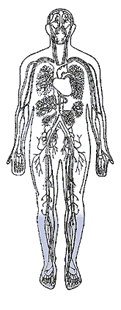 Peripheral vascular (puh-RIF-uh-rul VASK-yoo-ler) disease can happen when the openings in your blood vessels become narrow and not enough blood gets to your legs and feet. You may feel pain in your buttocks, the back of your legs, or your thighs when you stand, walk, or exercise.
Peripheral vascular (puh-RIF-uh-rul VASK-yoo-ler) disease can happen when the openings in your blood vessels become narrow and not enough blood gets to your legs and feet. You may feel pain in your buttocks, the back of your legs, or your thighs when you stand, walk, or exercise.
What can I do to prevent or control peripheral vascular disease?
- Don't smoke.
- Keep blood pressure under control.
- Keep blood fats close to normal.
- Exercise.
You also may need surgery to treat this problem.
Which medical tests will help me keep track of any heart or blood vessel problems?
- Have your blood pressure checked every time you see your doctor. Ask your doctor what your blood pressure is and what it should be.
- Your doctor may order an exercise stress test to see if you have any problems. The doctor will see how your heart performs during exercise.
- Have your blood fats checked once each year. This checkup includes four tests:
- Blood cholesterol. Your number should be 200 or lower.
- LDL (bad cholesterol). Your number should be 100 or lower.
- HDL (good cholesterol). Your number should be 45 or higher.
- Triglycerides (try-GLISS-er-ides) (the form in which energy is stored in your fat cells). Your number should be 200 or lower.
If your numbers are not normal, ask your doctor if you should take medicine to make them normal.
Diabetes Teachers (nurses, dietitians, pharmacists, and other health professionals). To find a diabetes teacher near you, call the American Association of Diabetes Educators toll-free at 1-800-TEAMUP4 (1-800-832-6874).
Recognized Diabetes Education Programs. (teaching programs approved by the American Diabetes Association). To find a program near you, call toll-free at 1-800-DIABETES (1-800-342-2383).
Dietitians. To find a dietitian near you, call the American Dietetic Association's National Center for Nutrition and Dietetics toll-free at 1-800-366-1655.
Government. The National Heart, Lung, and Blood Institute (NHLBI) is part of the National Institutes of Health. To learn more about heart and blood vessel problems, write or call NHLBI Information Center, P.O. Box 30105, Bethesda, MD 20824-0105, (301) 592-8573.
NIDDK


